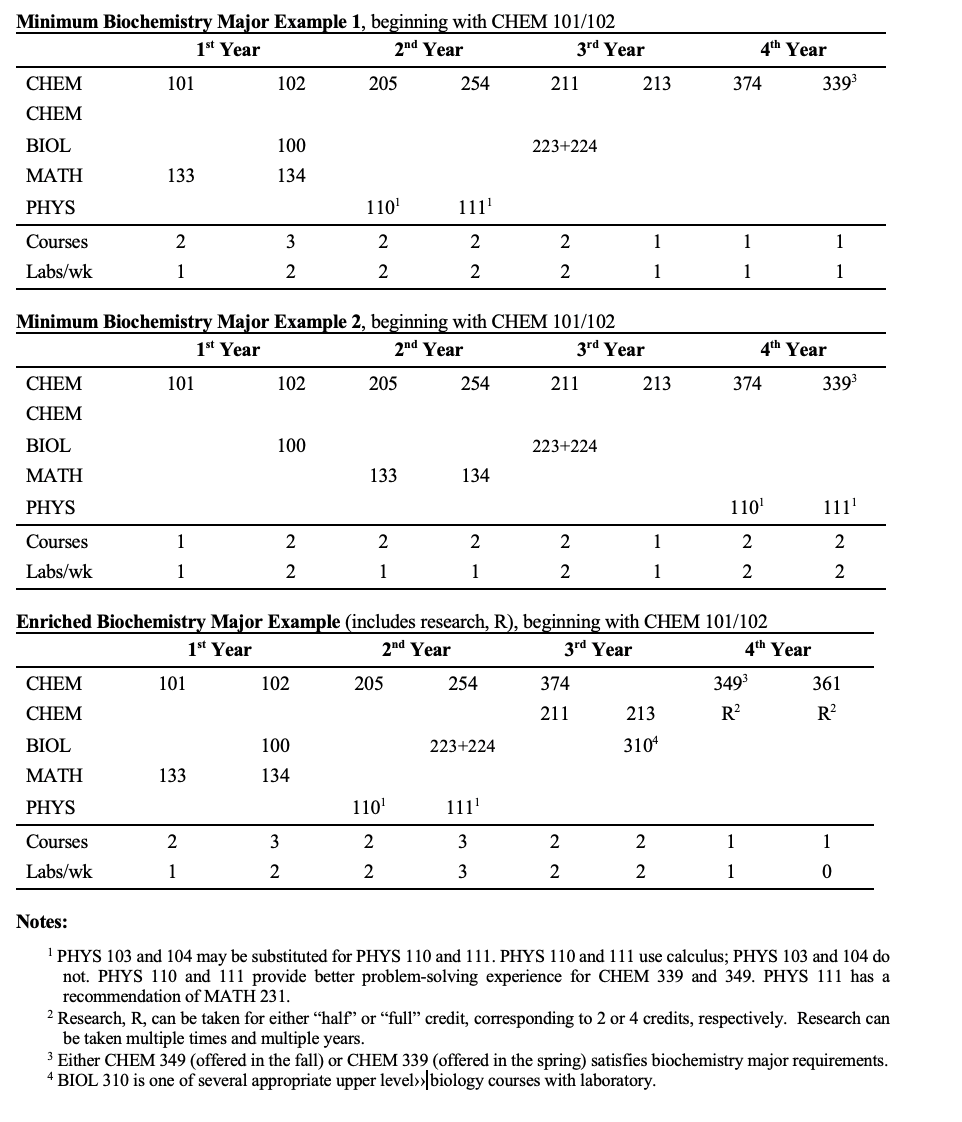| |
Feb 01, 2026
|
|
|
|
|
Course Catalog 2024-2025 [ARCHIVED CATALOG]
Biochemistry Major
|
|
The major consists of a minimum of 11.5 full courses (or the equivalent). Many students are required to complete 12.5 full courses to satisfy the general chemistry course requirement.
Note: Students must earn minimum grades of C- or P for all courses that apply toward the major, with the exception that one chemistry course in which a student has earned a grade of D may be used to fill the requirements of the major. However, no course in which a student has earned a D grade may be counted as a prerequisite.
 View the catalog page for the chemistry and biochemistry department. View the catalog page for the chemistry and biochemistry department.
|
Note(s) on Requirements
- Students placing into and beginning the biochemistry major with CHEM 102 do not need to take an additional course in place of CHEM 101 .
- Students placing into and beginning the biochemistry major with CHEM 205 who do not have credit for either CHEM 101 or CHEM 102 will need to take one additional full core chemistry or biochemistry course numbered 300 or above in place of general chemistry.
ACS-Certified Major Requirements
The Department of Chemistry and Biochemistry curriculum is approved by the American Chemical Society (ACS) and certifies graduates who satisfy the ACS guidelines.  Read the ACS’s publication on why to obtain an ACS-certified bachelor’s degree. Read the ACS’s publication on why to obtain an ACS-certified bachelor’s degree.
For ACS certification in biochemistry, majors must successfully complete: - The Minimum Major Requirements
- One Full (or Two Half) Additional 300-Level Chemistry Course(s)
- One Full (or Two Half) Research Course(s), including a well-written, comprehensive, well-documented research report
Transfer of Credit Toward the Major
Transferred credit for CHEM 101 or CHEM 102 counts toward the major. Study Away and Other Outside Coursework
Prior approval is required for chemistry coursework taken away from Oberlin to be applied to the biochemistry major. Note: Except for coursework transferred in at the time of entry by transfer students, the department cannot approve transfer of credit for courses taken at community colleges. At least half of the full courses (or equivalent) required for the major must be completed while in residence at Oberlin or enrolled in Oberlin programs. Students desiring an exception to this policy must obtain the explicit approval of the department chair. Normally, transfer credit for chemistry courses numbered 300 and above will not count toward the requirements of the biochemistry major.  View the detailed procedure and required forms for the department’s transfer of credit process. View the detailed procedure and required forms for the department’s transfer of credit process.
Recommended Pathways
Potential biochemistry majors are encouraged to take: - In their first year:
- By the end of their second year:
- As early as possible:
Key Constraints: 
Honors in Biochemistry
Students with outstanding records are invited to apply to participate in the Honors Program in Biochemistry. Selection of honors students occurs in the spring semester for the following fall. Seniors in the program elect a minimum of 1.5 full courses of CHEM 525/526 (with at least one half course in the first semester) and work year-long (including Winter Term) on a research project. Honors students write a thesis based on their research, give two presentations, and take an oral examination. Students majoring in both chemistry and biochemistry must choose which major will be applied to any honors conferred. Detailed Major Requirements
Biochemistry Major Course Lists
|
|
|